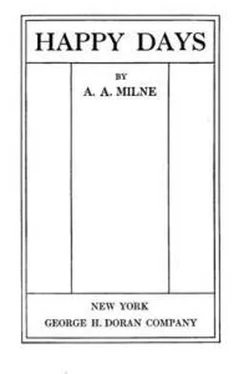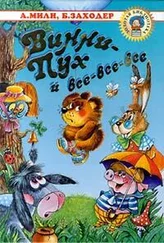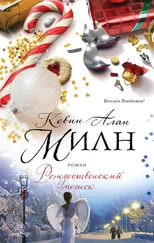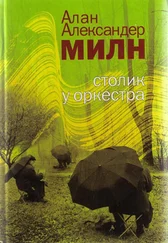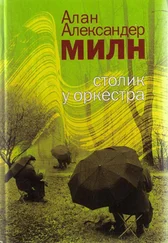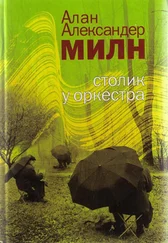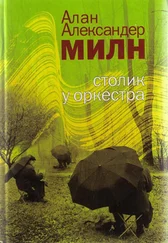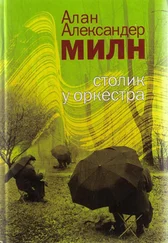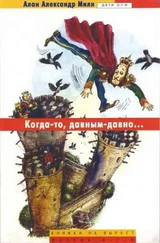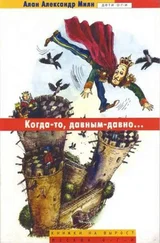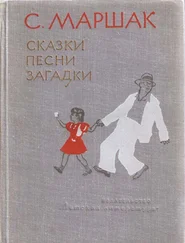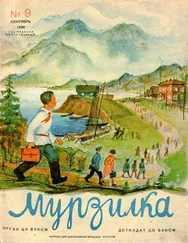Алан Милн - Happy Days
Здесь есть возможность читать онлайн «Алан Милн - Happy Days» весь текст электронной книги совершенно бесплатно (целиком полную версию без сокращений). В некоторых случаях можно слушать аудио, скачать через торрент в формате fb2 и присутствует краткое содержание. Год выпуска: 2014, Издательство: epubBooks Classics, Жанр: Юмористическая проза, на английском языке. Описание произведения, (предисловие) а так же отзывы посетителей доступны на портале библиотеки ЛибКат.
- Название:Happy Days
- Автор:
- Издательство:epubBooks Classics
- Жанр:
- Год:2014
- ISBN:нет данных
- Рейтинг книги:5 / 5. Голосов: 1
-
Избранное:Добавить в избранное
- Отзывы:
-
Ваша оценка:
- 100
- 1
- 2
- 3
- 4
- 5
Happy Days: краткое содержание, описание и аннотация
Предлагаем к чтению аннотацию, описание, краткое содержание или предисловие (зависит от того, что написал сам автор книги «Happy Days»). Если вы не нашли необходимую информацию о книге — напишите в комментариях, мы постараемся отыскать её.
Happy Days — читать онлайн бесплатно полную книгу (весь текст) целиком
Ниже представлен текст книги, разбитый по страницам. Система сохранения места последней прочитанной страницы, позволяет с удобством читать онлайн бесплатно книгу «Happy Days», без необходимости каждый раз заново искать на чём Вы остановились. Поставьте закладку, и сможете в любой момент перейти на страницу, на которой закончили чтение.
Интервал:
Закладка:
"This time," I said, "I shall hit the sphere properly," and with a terrific swing I stroked it gently into a gorse bush. I looked at the thing in disgust and then felt my pulse. Apparently I was still quite well. Thomson, forgetting about his liver, drove a beauty. We met on the green.
"Five," I said.
"Only five?" asked Thomson suspiciously.
"Six," I said, holing a very long putt.
Thomson's health had a relapse. He took four short putts and was down in seven.
"It's really rather absurd," he said, in a conversational way, as we went to the next tee, "that putting should be so ridiculously important. Take that hole, for instance. I get on the green in a perfect three; you fluff your drive completely and get on in—what was it?"
"Five," I said again.
"Er—five. And yet you win the hole. It is rather absurd, isn't it?"
"I've often thought so," I admitted readily. "That is to say, when I've taken four putts. I'm two up."
On the third tee Thomson's health became positively alarming. He missed the ball altogether.
"It's ridiculous to try to play," he said with a forced laugh. "I can't see the ball at all."
"It's still there," I assured him.
He struck at it again and it hurried off into a ditch.
"Look here," he said, "wouldn't you rather play the pro.? This is not much of a match for you."
I considered. Of course a game with the pro. would be much pleasanter than a game with Thomson, but ought I to leave him in his present serious condition of health? His illness was approaching its critical stage, and it was my duty to pull him through if I could.
"No, no," I said. "Let's go on. The fresh air will do you good."
"Perhaps it will," he said hopefully. "I'm sorry I'm like this, but I've had a cold hanging about for some days, and that on the top of my liver―"
"Quite so," I said.
The climax was reached at the next hole, when, with several strokes in hand, he topped his approach shot into a bunker. For my sake he tried to look as though he had meant to run it up along the ground, having forgotten about the intervening hazard. It was a brave effort to hide from me the real state of his health, but he soon saw that it was hopeless. He sighed and pressed his hand to his eyes. Then he held his fingers a foot away from him, and looked at them as if he were trying to count them correctly. His state was pitiable, and I felt that at any cost I must save him.
I did. The corner was turned at the fifth, where I took four putts.
"You aren't going to win all the holes," he said grudgingly, as he ran down his putt.
Convalescence set in at the sixth when I got into an impossible place and picked up.
"Oh, well, I shall give you a game yet," he said. "Two down."
The need for further bulletins ceased at the seventh hole, which he played really well and won easily.
"A–ha, you won't beat me by much," he said, "in spite of my liver."
"By the way, how is the liver?" I asked.
"Your fresh–air cure is doing it good. Of course it may come on again, but―" He drove a screamer. "I think I shall be all right," he announced.
"All square," he said cheerily at the ninth. "I fancy I'm going to beat you now. Not bad, you know, considering you were four up. Practically speaking, I gave you a start of four holes."
I decided that it was time to make an effort again, seeing that Thomson's health was now thoroughly re–established. Of the next seven holes I managed to win three and halve two. It is only fair to say, though (as Thomson did several times), that I had an extraordinary amount of good luck, and that he was dogged by ill–fortune throughout. But this, after all, is as nothing so long as one's health is above suspicion. The great thing was that Thomson's liver suffered no relapse; even though, at the seventeenth tee, he was one down and two to play.
And it was on the seventeenth tee that I had to think seriously how I wanted the match to end. Thomson at lunch when he has won is a very different man from Thomson at lunch when he has lost. The more I thought about it, the more I realised that I was in rather a happy position. If I won, I won—which was jolly; if I lost, Thomson won—and we should have a pleasant lunch.
However, as it happened, the match was halved.
"Yes, I was afraid so," said Thomson; "I let you get too long a start. It's absurd to suppose that I can give you four holes up and beat you. It practically amounts to giving you four bisques. Four bisques is about six strokes; I'm not really six strokes better than you."
"What about lunch?" I suggested.
"Good; and you can have your revenge afterwards." He led the way into the pavilion. "Now I wonder," he said, "what I can safely eat. I want to be able to give you some sort of a game this afternoon."
Well, if there is ever a Royal Commission upon the national physique I shall insist on giving evidence. For it seems to me that golf, far from improving the health of the country, is actually undermining it. Thomson, at any rate, since he has taken to the game, has never been quite fit.
XXIX
Chum
It is Chum's birthday to–morrow and I am going to buy him a little whip for a present, with a whistle at the end of it. When I next go into the country to see him I shall take it with me and explain it to him. Two day's firmness would make him quite a sensible dog. I have often threatened to begin the treatment on my very next visit, but somehow it has been put off; the occasion of his birthday offers a last opportunity.
It is rather absurd, though, to talk of birthdays in connection with Chum, for he has been no more than three months old since we have had him. He is a black spaniel who has never grown up. He has a beautiful astrachan coat which gleams when the sun is on it; but he stands so low in the water that the front of it is always getting dirty, and his ears and the ends of his trousers trail in the mud. A great authority has told us that, but for three white hairs on his shirt (upon so little do class distinctions hang), he would be a Cocker of irreproachable birth. A still greater authority has sworn that he is a Sussex. The family is indifferent—it only calls him a Silly Ass. Why he was christened Chum I do not know; and as he never recognises the name it does not matter.
When he first came to stay with us I took him a walk round the village. I wanted to show him the lie of the land. He had never seen the country before and was full of interest. He trotted into a cottage garden and came back with something to show me.
"You'll never guess," he said. "Look!" and he dropped at my feet a chick just out of the egg.
I smacked his head and took him into the cottage to explain.
"My dog," I said, "has eaten one of your chickens."
Chum nudged me in the ankle and grinned.
" Two of your chickens," I corrected myself, looking at the fresh evidence which he had just brought to light.
"You don't want me any more?" said Chum, as the financial arrangements proceeded. "Then I'll just go and find somewhere for these two."
And he picked them up and trotted into the sun.
When I came out I was greeted effusively.
"This is a wonderful day," he panted, as he wriggled his body. "I didn't know the country was like this. What do we do now?"
"We go home," I said, and we went.
That was Chum's last day of freedom. He keeps inside the front gate now. But he is still a happy dog; there is plenty doing in the garden. There are beds to walk over, there are blackbirds in the apple–tree to bark at. The world is still full of wonderful things. "Why only last Wednesday," he will tell you, "the fishmonger left his basket in the drive. There was a haddock in it, if you'll believe me, for Master's breakfast, so of course I saved it for him. I put it on the grass just in front of his study window, where he'd be sure to notice it. Bless you, there's always something to do in this house. One is never idle."
Читать дальшеИнтервал:
Закладка:
Похожие книги на «Happy Days»
Представляем Вашему вниманию похожие книги на «Happy Days» списком для выбора. Мы отобрали схожую по названию и смыслу литературу в надежде предоставить читателям больше вариантов отыскать новые, интересные, ещё непрочитанные произведения.
Обсуждение, отзывы о книге «Happy Days» и просто собственные мнения читателей. Оставьте ваши комментарии, напишите, что Вы думаете о произведении, его смысле или главных героях. Укажите что конкретно понравилось, а что нет, и почему Вы так считаете.
